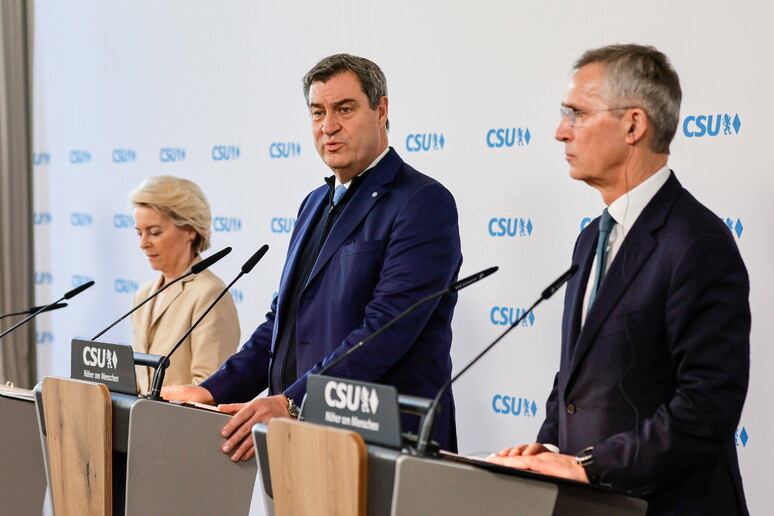Nine months before Joe Biden stands
for reelection in November, US Secretary of State Antony Blinken
takes part in the Munich Security Conference alongside Vice
President Kamala Harris. He faces an uphill climb to quell
doubts on US leadership. The conference which starts on Friday
brings together the world's elite defence policy makers each
year and is seen as a barometer on transatlantic relations.
"It's very clear to me wherever I go, and when I speak to
people, that people watching the US appear very nervous," said
Comfort Ero, head of the International Crisis Group think-tank.
"I think the US is still seen as an influential player - both
positively and negatively - internationally. But I think
increasingly there's alarm, there's concern, there is
uneasiness, about the uncertainty, the unpredictability, just
the polarisation, the division," she said.
Calls for stronger European stance on security within NATO
On Monday, European Parliament President Roberta Metsola said
more needed to be done in terms of individual countries' defence
spending, but Europe would send a "clear message irrespective of
who will lead the next American administration" that the EU is
"strong enough to be able to defend each other".
"The biggest asset of the West against Putin is our unity. The
last thing we should do is to throw that away," Belgian Prime
Minister Alexander De Croo reacted to Trump's comments. However,
De Croo acknowledged that Europe has the responsibility to take
its security in its own hands. "In the years to come we have to
build a stronger European pillar within NATO."
While Belgium is among those with the worst track record on
defence spending in years, De Croo insists that this trend has
been reversed. "Year after year, Belgium is spending more money
on defence now," the prime minister said. "But we also have to
look at the way this spending is happening, so as to make sure
that our own industry, in Belgium and in Europe, will be able to
grow as well."
In late January, Bulgarian defence minister Todor Tagarev
stressed that "the European Defence Industrial Strategy should
outline effective ways to overcome the EU's dependencies on raw
materials, energy and critical technologies, as well as
introduce measures and instruments to increase the production of
defence products, promote innovation and competitiveness of the
defence sector".
France-Germany-Poland: Revived Weimar triangle "new boost" for
EU
Earlier this week, new Polish Prime Minister Donald Tusk visited
German Chancellor Olaf Scholz in Berlin and French President
Emmanuel Macron in Paris to coordinate foreign policy
cooperation between the countries and ramp up security
cooperation in Europe.
Scholz also said at the joint press conference that Germany and
Poland were working together. Solidarity and joint action were
indispensable. The German chancellor said: "Especially at a time
when Russia's imperialism is threatening our common security in
Europe. That is why we stand up for each other in the EU and in
NATO."
Tusk emphasised that the EU was superior to Russia in economic
and financial terms. "It is certainly not the lack of money that
will decide the fate of this war, this confrontation between
Russia and Ukraine." However, Tusk added, greater determination
is needed to use Europe's wealth for security and defence.
Macron praised Tusk and his government as "trusted, pro-European
partners" who are "clear on European security". He also
reiterated calls to strengthen the European defence industry.
"This is what will also make it possible to make Europe a
security and defence power complementary to NATO, the European
pillar of the Atlantic alliance," he said. In January, the
French president called on European countries to get ready to
back Ukraine in case Washington decides to pull the plug on aid.
Separately, newly appointed French Foreign Minister Stéphane
Séjourné hosted German counterpart Annalena Baerbock and
Radosław Sikorski of Poland just outside Paris. The meeting,
held in the so-called Weimar Triangle format, included a
discussion on deepening foreign policy and security cooperation.
The format is an alliance the three nations created in 1991 in
order to work together on European issues. Scholz hailed the
revived partnership of the trio as "very important to all of
us", calling for "new momentum" behind the Weimar Triangle to
provide a "new boost" to the European Union.
Europe needs another "life insurance" policy in addition to
NATO, Séjourné said, following the comments by Trump. "Yes, we
need a second life insurance, not in substitution to or against
NATO but in addition" to the alliance, he said. Séjourné
insisted that it was necessary to build on the European element
of NATO and build up its own defence industry and "buy European
within the framework of our defence industries and prepare in
the event of conflict".
"We need to take care of the security of Ukrainians, and that
means taking care of our security, and yes, I think we need a
union of defence and security, with joint purchases and pooling
our forces," Annalena Baerbock added.
This article is published weekly. The content is based on news
by agencies participating in the enr, in this case AFP,
Agerpres, Belga, BTA, CTK, dpa, EFE, Europa Press, and STA.
ALL RIGHTS RESERVED © Copyright ANSA











